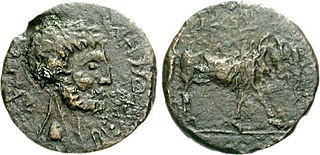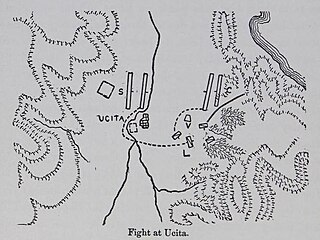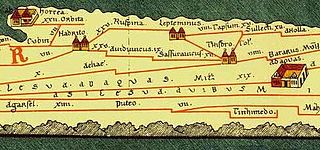
This article concerns the period 49 BC – 40 BC.
Year 49 BC was a year of the pre-Julian Roman calendar. At the time, it was known as the Year of the Consulship of Lentulus and Marcellus. The denomination 49 BC for this year has been used since the early medieval period, when the Anno Domini calendar era became the prevalent method in Europe for naming years.
Year 46 BC was the last year of the pre-Julian Roman calendar. At the time, it was known as the Year of the Consulship of Caesar and Lepidus. The denomination 46 BC for this year has been used since the early medieval period, when the Anno Domini calendar era became the prevalent method in Europe for naming years.

The Battle of Thapsus was a military engagement that took place on April 6, 46 BC near Thapsus. The forces of the Optimates, led by Quintus Caecilius Metellus Scipio, were defeated by the forces of Julius Caesar. It was followed shortly by the suicides of Scipio and his ally, Cato the Younger, the Numidian King Juba, and his Roman peer Marcus Petreius.

Juba I of Numidia was a king of Numidia who reigned from 60 to 46 BC. He was the son and successor to Hiempsal II.

Bocchus II was a king of Mauretania in the 1st century BC. He was the son of Mastanesosus, who died in 49 BC, upon which Bocchus inherited the throne.
Publius Attius Varus was the Roman governor of Africa during the civil war between Julius Caesar and Pompey. He declared against Caesar, and initially fought Gaius Scribonius Curio, who was sent against him in 49 BC.

Caesar's civil war was a civil war during the late Roman Republic between two factions led by Gaius Julius Caesar and Gnaeus Pompeius Magnus (Pompey), respectively. The main cause of the war was political tensions relating to Caesar's place in the republic on his expected return to Rome on the expiration of his governorship in Gaul.

Bogud, son of King Mastanesosus of Mauretania, was a Berber joint king of Mauretania with his elder brother Bocchus II, with Bocchus ruling east of the Moulouya River and his brother west. An important ally of Julius Caesar, Bogud later supported Mark Antony in the power struggle between Antony and Octavian. He was deposed by his brother and was killed at the siege of Methone prior to the Battle of Actium.
The Battle of the Bagradas occurred near the Bagradas River in what is now Tunisia on 24 August and was fought between Julius Caesar's general Gaius Scribonius Curio and the Pompeian Republicans under Publius Attius Varus and King Juba I of Numidia. The result was a crushing defeat for the Caesarean forces and the death of Curio.

The Battle of Utica in Caesar's Civil War was fought between Julius Caesar's general Gaius Scribonius Curio and Pompeian legionaries commanded by Publius Attius Varus supported by Numidian cavalry and foot soldiers sent by King Juba I of Numidia. Curio defeated the Pompeians and Numidians and drove Varus back into the town of Utica.

Leptis or Lepcis Parva was a Phoenician colony and Carthaginian and Roman port on Africa's Mediterranean coast, corresponding to the modern town Lemta, just south of Monastir, Tunisia. In antiquity, it was one of the wealthiest cities in the region.
Marcus Petreius was a Roman politician and general. He was a client of Pompey and like Pompey he came from Picenum a region in eastern Italy. He cornered and killed the notorious rebel Catiline at Pistoia.
Publius Sittius was a Roman equites and mercenary commander. As a mercenary he was employed by king Bocchus II of East-Mauretania. Sittius fought for Bocchus against king Juba I of Numidia, capturing Juba's capital of Cirta and defeating the Numidian army under general Saburra. He also supported Julius Caesar in the civil war between Caesar and the Optimates, ultimately catching and killing Faustus Cornelius Sulla and Lucius Afranius and destroying Scipio's fleet off Hippo Regius. He was a personal friend of Marcus Tullius Cicero.
Arabio was the last independent Numidian king, ruling the western region between 44 and 40 BC. According to Appian, he was a son of Masinissa II and probable grandson of Gauda, who had divided Numidia between his sons in 88 BC. He was of Massylian origin.
Gaius Scribonius Curio was the son of Gaius Scribonius Curio, consul in 76 BC and censor in 61 BC. His political allegiances changed over the course of the 50s BC until his tribunate, when he sided with Julius Caesar after possibly receiving a massive bribe. During the civil war, he sided with Caesar and led Caesarian troops to Sicily and then to Africa, where he was killed in battle.
The Battle of Hippo Regius was a naval encounter during Caesar's Civil War which occurred off the coast of the African city of Hippo Regius in 46 BC. Metellus Scipio and a number of influential senators from the Optimate faction were fleeing the disastrous Battle of Thapsus when their fleet was intercepted and destroyed by Publius Sittius, a mercenary commander in the employ of the Mauretanian king Bogud, an ally of Gaius Julius Caesar's. Scipio committed suicide and all of the other senators were killed during the battle.
The Battle of Ascurum took place in 46 BC during Caesar’s Civil War and saw the defeat of a force under Pompey the Younger in battle against the Mauretanians.
The siege of Curicta was a military confrontation that took place during the early stages of Caesar's Civil War. Occurring in 49 BC, it saw a significant force of Populares commanded by Gaius Antonius besieged on the island of Curicta by an Optimate fleet under Lucius Scribonius Libo and Marcus Octavius. It immediately followed and was the result of a naval defeat by Publius Cornelius Dolabella and Antonius eventually capitulated under prolonged siege. These two defeats were some of the most significant suffered by the Populares during the civil war.
The Battle off Carteia was a minor naval battle during the latter stages of Caesar's civil war won by the Caesarians led by Caesar's legate Gaius Didius against the Pompeians led by Publius Attius Varus.







